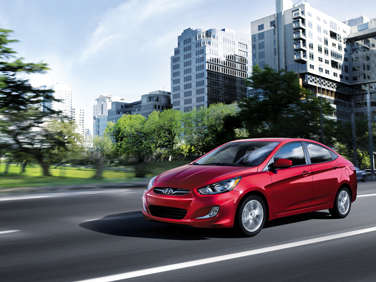Recent Articles
Popular Makes
Body Types
How the New Hyundai Accent Can Make its Mark

We won't be seeing the July sales results for nearly two weeks yet, but I can already tell that—thanks to the all-new 2012 Hyundai Accent—the numbers in the subcompact segment will be particularly informative. The Accent actually went on sale in June, but this will be its first complete month in dealerships, and the car represents the next stage in the evolution of the segment. It's not the first post-meltdown subcompact to debut—that honor, of course, went to the Ford Fiesta—but it will be the first next-gen model to provide competition for the Ford, providing an important early opportunity to gauge the strength of customer demand for improved subcompacts as a whole, as opposed to the specific demand for Ford's first entry in that segment in years.
In addition, the Accent has gotten to the market ahead of key all-new rivals like the Chevrolet Sonic, Nissan Versa sedan and Kia Rio, so we'll have a relatively uncluttered playing field on which to see if the Accent has what it takes to elevate its game in the way the Hyundai Sonata and Hyunda Elantra have.
Subcompacts Still Looking for a Leader
First, let's take a gander at the state of the subcompact segment, which has been surprisingly moribund so far this year. Part of this is due to the lack of new product here, especially as compared to the compact category, which has seen the VW Jetta, Hyundai Elantra, Chevrolet Cruze, Ford Focus and Honda Civic all launch new models over a short-ish period. And since these are all new-gen models, they offer comprehensive content and efficiency upgrades over the older subcompacts, certainly helping them to take customers who might have otherwise opted for even smaller vehicles.
Another issue is that the one all-new subcompact with any kind of track record so far, the Ford Fiesta, really hasn't caught fire like some expected. Ford claims to be happy with its performance, and most outlets list it as the top seller in the segment, but here are a few things to consider: The baby Blue Oval sold 5,535 units in June, and that bested all the traditional subcompacts, but the Kia Soul—which is the size of a subcompact even though it usually is not counted among them—more than doubled that mark with 11,314 June sales. Then, looking backward, you can see that the Versa had reached 54,537 sales by this time last year, when it was on its way to becoming the 2010 volume leader in the segment. The Fiesta is well behind that figure through the first six months of 2011, gaining just 42,129 sales in that period.
It's also notable that sales of the Honda Fit have reignited. After withstanding an 18.7 percent drop in volume in 2010, the Fit's numbers are up a whopping 46.7 percent through the first half of this year, and that's despite the effect of this spring's disasters in Japan. At the least, I read this as saying that a not-insignificant number of subcompact shoppers are proving resistant to the charms of the Fiesta.
An Accent on Fuel Efficiency
Now, what got me thinking about the situation with the Accent was a sort of throw-away line I read recently connecting Hyundai's overall sales improvement with its fuel efficiency—or its fuel-efficiency marketing, anyway. The automaker has been making a lot of news for its impressive sales-weighted fleet fuel-economy, which—helpfully self-reported by Hyundai—stood at 35.9 mpg for June and 35.7 mpg for the year to date. Hyundai is gaining some nice buzz for those numbers, as well as for its decision to report them, and John Krafcik, president and CEO of Hyundai Motor America, has been working diligently to let people know his company, for one, isn't afraid of getting to a +50 mpg CAFE floor by 2025.
The reality is a bit more complicated, even with the addition of the 40-mpg Accent. One of the major reasons Hyundai is able to achieve these kinds of fuel-economy numbers is that its crossovers aren't seeing nearly the same kind of sales as its cars. In the first half of 2011, Hyundai's car sales are up 38.2 percent, but it's "light truck" sales are down 7.3 percent. That makes the company one of just four in the U.S. marketplace to report a sales decline on the truck/crossover side of the ledger, the others being Toyota, down 1.4 percent; Subaru, down 13.2 percent; and Saab, down a nifty 100 percent.
In the long term, a conscious decision to go with an all-car lineup, if it includes some sort of people mover, could very well be a successful strategy. But that's not what's going on at Hyundai right now. Hyundai is simply putting a sharp marketing focus on cars and letting its crossovers flounder the best they can. On the other hand, with cars like the Accent, maybe that won't be a problem after all.